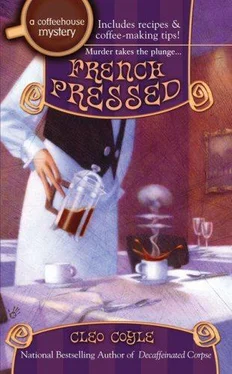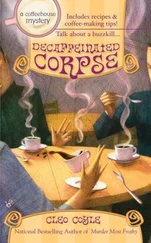Клео Коул - French Pressed
Здесь есть возможность читать онлайн «Клео Коул - French Pressed» весь текст электронной книги совершенно бесплатно (целиком полную версию без сокращений). В некоторых случаях можно слушать аудио, скачать через торрент в формате fb2 и присутствует краткое содержание. Год выпуска: 2008, ISBN: 2008, Издательство: Berkley, Жанр: Детектив, на английском языке. Описание произведения, (предисловие) а так же отзывы посетителей доступны на портале библиотеки ЛибКат.
- Название:French Pressed
- Автор:
- Издательство:Berkley
- Жанр:
- Год:2008
- ISBN:1-4362-0811-4
- Рейтинг книги:3 / 5. Голосов: 1
-
Избранное:Добавить в избранное
- Отзывы:
-
Ваша оценка:
- 60
- 1
- 2
- 3
- 4
- 5
French Pressed: краткое содержание, описание и аннотация
Предлагаем к чтению аннотацию, описание, краткое содержание или предисловие (зависит от того, что написал сам автор книги «French Pressed»). Если вы не нашли необходимую информацию о книге — напишите в комментариях, мы постараемся отыскать её.
French Pressed — читать онлайн бесплатно полную книгу (весь текст) целиком
Ниже представлен текст книги, разбитый по страницам. Система сохранения места последней прочитанной страницы, позволяет с удобством читать онлайн бесплатно книгу «French Pressed», без необходимости каждый раз заново искать на чём Вы остановились. Поставьте закладку, и сможете в любой момент перейти на страницу, на которой закончили чтение.
Интервал:
Закладка:
Keitel cleared his throat. “So, Clare, what have you brought here that’s got Nappy so excited?”
“This Kenyan coffee to start.” I poured Chef Keitel a cup.
He sipped, paused, and drank more.
“You’re sampling the legendary SL-28,” I informed him, “probably the most respected coffee varietal in the world.”
“Is that so?” Keitel exchanged glances with Dornier. “And how did you get hold of it?”
“Well, most coffee farms in Kenya are small. They form cooperatives and auction their lots on a weekly basis, primarily to big exporters, which is why most Kenyan coffee ends up in blends. But Matteo, our buyer, doesn’t rely on a big exporter. He goes directly to the bidders at the Nairobi Coffee Exchange to score pure, uncut lots for our coffeehouse business.”
I refilled the men’s cups. “Matt samples the lots personally to make sure we’re getting the crème de la crème of the Kenyan coffee experience. The green beans are shipped to New York, and I personally roast them in our basement. The moment a bean is roasted, it begins to lose flavor, so I roast regularly to ensure superior quality with every cup.”
Chef Keitel exchanged another glance with his maître d’. The chef’s expression remained neutral, but from the single nod and arching of one eyebrow, I got the idea he was favorably impressed.
“I brought four other wonderful coffees for you to sample today.” I forced a smile. “Shall I prepare them?”
“I don’t think so.” Keitel folded his arms and regarded me. “Look, this Kenyan coffee is good enough, and I appreciate the trouble you’ve gone to, but—as I understand it—this little presentation came about as a result of your own coffee experience here last evening?”
Dornier visibly tensed. “Please, Tommy. Let’s not go there.”
“No,” he said. “I want Clare to understand why she was given whatever swill she was served last night.”
Dornier let out a tortured sigh and waved his hand. “You explain.”
“Nappy here has trained his waiters to provide the highest-quality service possible. So when a customer asks for something that’s not on the menu, his server—in your case, René—will attempt to supply it so that the dining experience is not a disappointment.”
“I see.”
“No, you don’t,” said Keitel. “Coffee is not on our menu. And it never was. Since you ordered it, René took it upon himself to brew you some from our employee coffeemaker.”
Dornier appeared to sink down farther in his chair.
“Let me guess,” I said. “The machine’s old. It’s dirty. And the coffee that’s brewed inside it comes in preground aluminum packets with unspecified expiration dates.”
“I had no idea this was going on,” Keitel said. “Now—thanks to you, Clare—I do .”
“And now you can do something about it,” I countered.
“Yes. I can.” Keitel’s blue gaze speared Dornier. “I can make sure we never serve employee coffee to our paying customers again .”
“ Or you can put quality specialty coffees on your menu,” I pressed.
Keitel shook his head. “Why would I want to go to the trouble?”
“For profit, of course.”
“My customers don’t order coffee.”
“If it’s not on your menu, how can they order it?”
“You’re arguing an unsubstantiated point.”
“I can substantiate it in two seconds flat. Do you know what your customers are doing after they leave your restaurant?”
Keitel frowned. “What does that have to do with—”
“They drive to Long Island and north Jersey. They check the overseas markets. They head downtown to party into the wee hours. I grant you that a portion of your clientele would be only too happy to continue drinking port, ice wine, or cognac on top of the substantial amount of vino they’ve already consumed with their food, but this is New York. The night is just beginning at nine or ten o’clock when they leave your dining room. Offering coffee is a way to wake up for the drive home, the ongoing business deal, even the lovemaking that goes on, after dinner is concluded.”
Keitel stared at me for so long, I thought perhaps he’d been flash frozen. Did the man think I was completely nuts? I glanced at Dornier. He was still sipping the Kenyan, apparently waiting for his chef de cuisine to make the decision.
“Look…” I pressed, “why not at least try a dessert pairings menu with my coffee? Give it one week. I promise you’ll not only sell my coffee at premium prices to people who would have declined more alcohol anyway, you’ll sell more desserts.”
Dornier sat up a little straighter. “Did you hear that, Tommy?”
Keitel grunted once. He stared for another few silent moments, then without any discernable articulation of words, turned and stalked back toward his kitchen.
Crap.
I figured that was it. I was dismissed. Time to pack in my French presses and go—until I realized Keitel hadn’t disappeared through the swinging gateway to his domain. Instead, he was holding one door open and sticking his head through it.
“Janelle!” he bellowed into the busy kitchen. “Come out here!”
An attractive, full-figured, African American woman answered the command. She wore a burgundy chef’s jacket and a flat, burgundy baker’s cap. Beneath the cap, her shoulder-length ebony hair was styled in rows of beautiful tight braids. Her skin was mocha, and her roundish thirtyish face displayed Creole features.
“What is it, Chef?” she called, wiping her hands on the white towel that was thrown over her shoulder.
Keitel held the door open for her. “Come with me, please,” he said, his voice softer and much more polite as she moved toward him.
“Janelle, this is Ms. Clare Cosi,” he said, leading her to our table. “Ms. Cosi is Joy Allegro’s mother. She also happens to manage a coffeehouse downtown, and she’s proposing a contract with us to supply gourmet coffee.”
Janelle’s face immediately brightened. “Are you asking my opinion, Chef?”
“I am.”
“By all means, let’s taste what she’s brought!”
He speared me with his gaze. “Clare, I’d like you to meet Janelle Babcock, our pastry chef. If you’re proposing a dessert pairings menu with your coffee, you’d better win her over.”
I held out my hand. Janelle shook it with surprising fervor. “I’m very pleased to meet you, Ms. Cosi—”
“Please call me Clare.” I smiled at the woman, realizing this was the Janelle that Joy had mentioned to me weeks ago. She was a graduate of Le Cordon Bleu in Paris and had come to Solange not from France but from the pâtissier position in a New Orleans restaurant that had been destroyed by Hurricane Katrina.
According to Joy, Janelle had been the kindest to her of all the line cooks in Tommy’s kitchen. The woman had lost everything in the storm: her job, her home, her dream of opening her own bakery. Apparently, when Tommy Keitel had heard about her plight from a colleague, he’d gone out of his way to make a place for her on his staff. She’d started as an assistant to the existing pastry chef but quickly assumed the lead position when that chef moved along.
According to Joy, Janelle was saving up her money to move back down to Louisiana and start again. But she was beginning to get nervous, because the desserts at Solange weren’t moving—the very reason her predecessor had left.
From my own sampling of her cuisine the previous evening, I knew the quality of her confections wasn’t the issue. Her desserts were being sabotaged, it seemed to me, by the lousy, palate-poisoning coffee that the waiters had been permitted to serve with those amazing creations.
Читать дальшеИнтервал:
Закладка:
Похожие книги на «French Pressed»
Представляем Вашему вниманию похожие книги на «French Pressed» списком для выбора. Мы отобрали схожую по названию и смыслу литературу в надежде предоставить читателям больше вариантов отыскать новые, интересные, ещё непрочитанные произведения.
Обсуждение, отзывы о книге «French Pressed» и просто собственные мнения читателей. Оставьте ваши комментарии, напишите, что Вы думаете о произведении, его смысле или главных героях. Укажите что конкретно понравилось, а что нет, и почему Вы так считаете.












